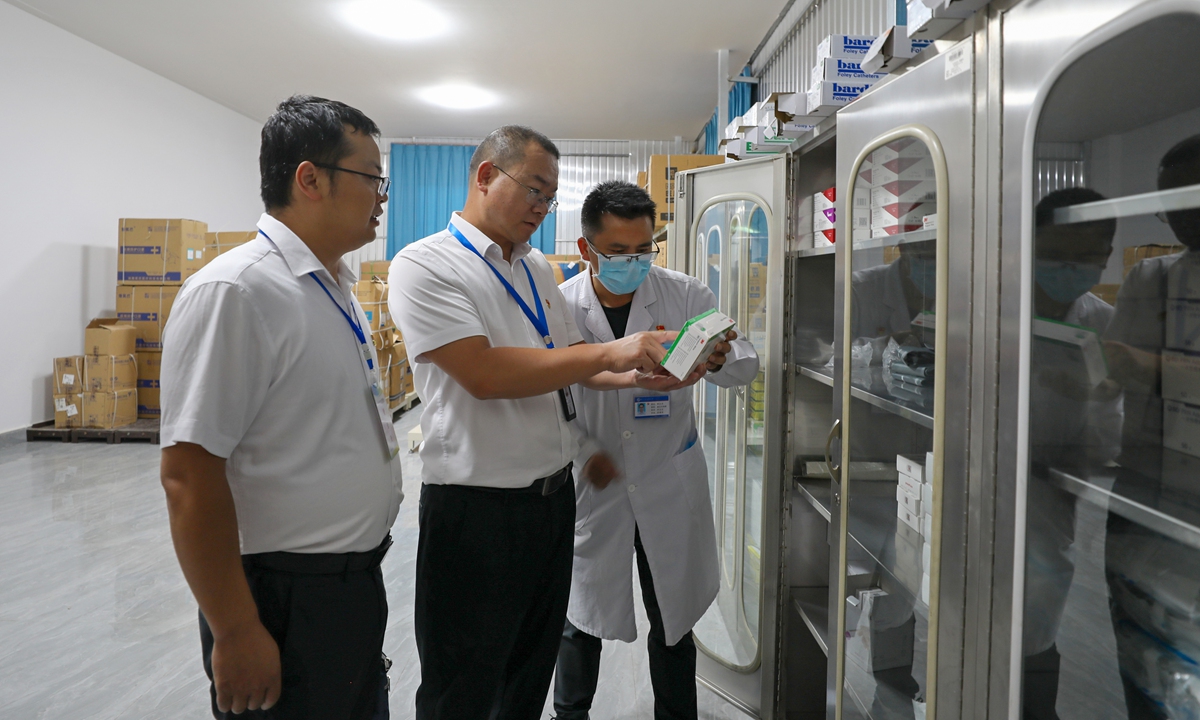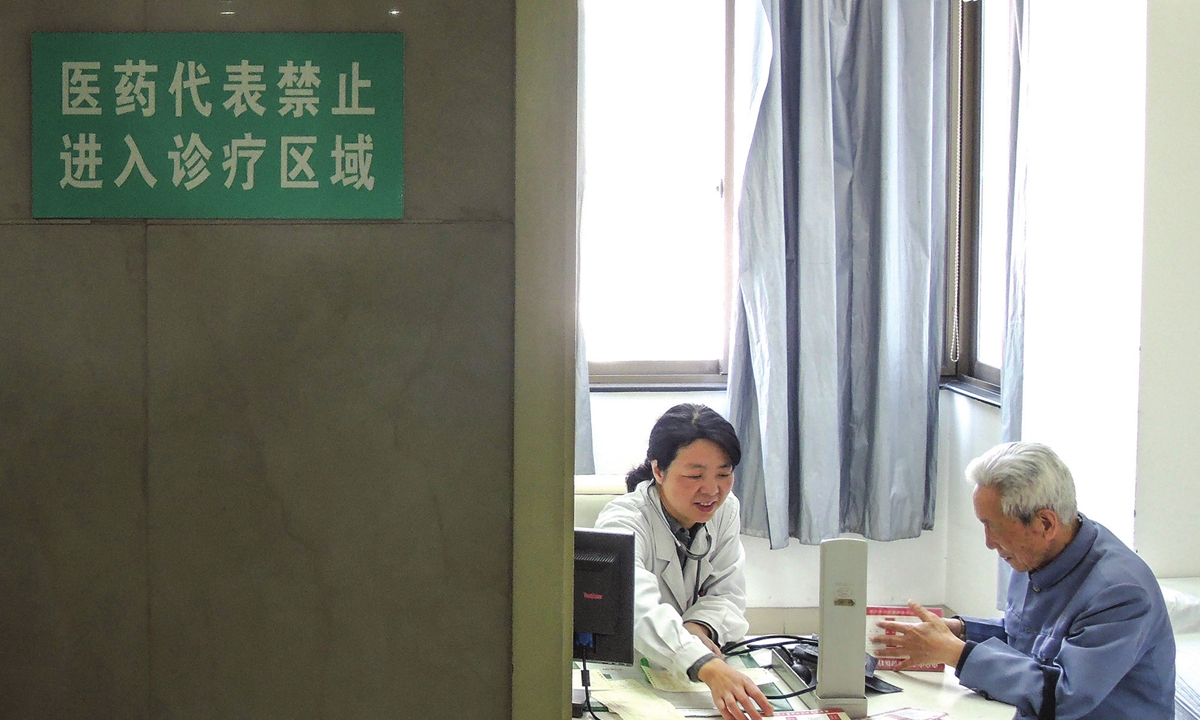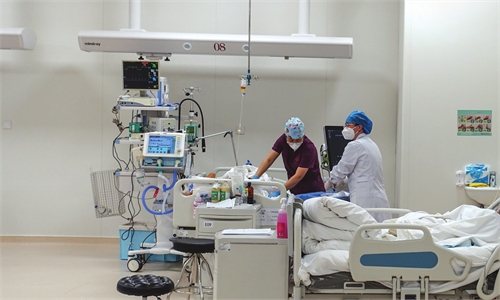IN-DEPTH / IN-DEPTH
China vows unprecedented, year-long anti-graft campaign in medical sector to rectify prominent malpractices
Resolute crackdown

Representatives of the disciplinary watchdog conduct an inspection of drug procurement, sales, and use at a hospital in Luliang county, Southwest China's Yunnan Province, on August 7, 2023. Photos: VCG
An unprecedented anti-corruption storm is currently sweeping through the field of medicine in China.
Over the last three weeks, intensive inspections have been launched in medical institutions nationwide, with tip-offs from the public and industry-related personnel increasing on social media platforms, and numerous reports of fallen officials have emerged one after another… So far, at least 20 provincial disciplinary authorities have spoken out against corruption present in the medical and pharmaceutical industries, while at least 176 hospital heads have been probed - more than double the number in 2022 - during the "most vigorous" crackdown ever seen in the healthcare industry.
Initiated by the National Health Commission (NHC), along with nine other departments, in late July, the systematic anti-corruption campaign has impressed many with its top-down rapidity, fierce momentum, and strong determination.
Why is the current anti-corruption campaign in the medical industry necessary and urgent? What are the deep-rooted problems that are a cause of distress for the public? From the bribery of pharmaceutical companies to the unaffordability of treatment for ordinary patients, how were medical costs gradually inflated? What are the blind spots within the industry and hidden means through which ill-gotten gains are laundered in this profitable industry chain?
Industry insiders, clinicians, and medical representatives reached by the Global Times pointed out that medical corruption in China has led to the exploitation of the healthcare system, ultimately causing harm to ordinary people and damaging the reputation of the national healthcare service delivery. In order to address the issue of difficulties in accessing medical services amid an aging society, large-scale anti-corruption efforts and systematic reforms are deemed necessary.
Meanwhile, many grassroots doctors and experts stressed that the actions of a corrupt few do not represent the vast majority of diligent and dedicated frontline healthcare professionals. The achievements of China's healthcare reforms in recent years cannot be erased or negated by a few cases of corruption.

Photo: VCG
Shock and awe
China's top anti-graft watchdog, the Central Commission for Discipline Inspection, or the CCDI, published an article on July 28, targeting opaque collaborations, bribery of officials in public hospitals, and the misuse of prescriptions for personal profit among other illegal practices.
The NHC held a press conference on Tuesday, reiterated six key areas of focus for rectification during this campaign, which include crackdown on medical institutions engaging in "kickback sales" of drugs and devices, as well as the improper use of medical insurance funds, stressing that the pharmaceutical field is the "main battleground" for safeguarding the health of the people.
Compared with previous efforts, the current round of anti-graft campaigns involves the participation of more governmental agencies, which is more far-reaching and affecting more high-powered individuals in the medical sector, pharmaceutical firms, and relevant associations, Xu Yucai, a veteran in medical reform, told the Global Times.
Rough estimates show that at least 30 "deans," "directors," and "Party chiefs" in the medical system have been investigated across various levels in hospitals over the last three weeks, and about half of them have retired. More violators are being pressured to voluntarily surrender.
A number of regions, including Beijing, Inner Mongolia, and Sichuan, have made reporting hotlines available to the public. A wave of complaints has since been received from several places and some of the country's well-known hospitals.
Insiders told the Global Times that guidelines on discipline in hospitals have intensified, as relevant inspections of key heads of department are increasing.
Amid the campaign, a slew of cancellations of medical conferences and events sponsored by pharmaceutical companies have been witnessed, which is evidence of a deterrence effect.
"Currently, the [domestic medical representatives] industry is basically in a vigilant state," a medical representative told the Global Times on condition of anonymity. "Both domestic and foreign-funded pharmaceutical companies are generally freezing their contacts with hospital and officials, and some have migrated their businesses online exclusively or are more discreet, as many in the industry are now cautious and apprehensive."
The medical representative noted that workshops and training programs in the medical sector have been largely canceled as these platforms have been found to have become a convert channel for bribery and kickbacks.
Chain of medical corruption
High medical spending has long been one of "three burdens" - along with housing and education - for Chinese citizens. In an aging society, the cost burden of managing chronic conditions plagues many senior citizens, and is a source of public complaint.
Back in the 1990s, as medical services moved toward market compliance, the government reduced investment and hospitals began to sell drugs at a mark-up to make up for shortfalls in public funding. At the same time, competition intensified among pharmaceutical companies, while corruption spaces grew gradually.
The culture of kickbacks or bribery among hospital officials and pharmaceutical enterprises across many regions in China has been a long-standing open secret.
Medical corruption may occur in the entire process, from listing, bidding, procurement, to usage and payment. Every stage involves relevant departments, hospital management personnel, clinicians, and pharmacists, Xu said.
In this chain, medical representatives are those who "thread the needle," and the senior hospital officials are the key figures who can determine the clinical usage and the quantity purchase of products from the bid winner, according to Xu.
The expert said that some kickbacks are hard to investigate as they could be disguised as sponsorship or invitations to medical conferences.
Xu, also the former deputy head of the health commission in Shanyang county, Northwest China's Shaanxi Province, told the Global Times that in recent years, as previous anti-corruption moves have sealed off the traditional benefit delivery pipeline between pharmaceutical companies and medical personnel, some poorly scrutinized medical associations have turned to "academic activities" as a disguise to transfer the benefits. Bribes are thus laundered through so-called training or consultancy fees.
A doctor from a certain top-tier hospital once disclosed to the media that some academic conferences typically offer ordinary doctors a fee of 1,200 yuan ($165) per hour for lectures, 1,800 yuan for experts, and 3,000 yuan for top-level experts.
Additionally, the procurement of large medical equipment is another hotbed of corruption. In case of illegality disclosed in recent years, inappropriate high-priced medical equipments are commonly seen. In May, China's anti-corruption body exposed a hospital chief in Southwest China's Yunnan Province for receiving 16 million yuan in bribes for buying a medical accelerator worth 15 million yuan.
A practitioner surnamed Tao from the Shanghai disease control and prevention system told the Global Times that the selection of self-funded vaccines has also become a means of making money in some grassroots disease control centers.
"County-level disease control centers are allowed to select vaccines from different manufacturers on the provincial whitelist. Currently, this process lacks standard rules, and the head of the county center holds the principle decision-making power in that regard," said Tao.

A sign in a hospital prohibits the entry of pharmaceutical representatives into the treatment area in Nanjing, the capital of East China's Jiangsu Province.
Intense move for retoring confidenceTo address this issue, the Chinese government has implemented several measures to crack down on corruption in the medical industry. One such initiative was the establishment of the National Healthcare Security Administration (NHSA) in 2018, which oversees the country's healthcare system and is responsible for regulating medical expenses and combating fraud.
Xu recalled that obvious efforts have been made in medical reform since the establishment of the NHSA. The centralized pharmaceutical procurement system launched in China in 2018, for example, has reduced the prices of certain drugs, by pooling the demands of member cities and granting contracts to manufacturers with the lowest bids. These policies have played a great role in eliminating kickbacks and price manipulation.
Additionally, the government has encouraged the use of electronic payment systems to reduce cash transactions, which were often used to facilitate bribery, Xu said.
The programs have successfully reduced medical costs for patients and have, so far, helped save about 300 billion yuan in medical insurance costs and patient expenditure, the Xinhua News Agency reported in July 2022.
Furthermore, the Chinese government has strengthened its enforcement actions against corrupt practices in the medical field. Numerous high-profile cases have been investigated and prosecuted, leading to the arrest and punishment of doctors, hospital administrators, and pharmaceutical company executives involved in bribery and embezzlement.
With deepened medical and healthcare system reform, China's public healthcare system withstood the tests of the H7N9 bird flu, the Middle East respiratory syndrome, and COVID-19, as well as natural disasters such as earthquakes and floods over the last decade.
The era when pharmaceutical representatives freely prowled outpatient clinics and hospital wards is long gone. Instead, signs warning that "Pharmaceutical representatives are prohibited from entering" are now posted throughout healthcare facilities.
"Over the last decade, China hasn't remitted in its anti-corruption efforts, but corruption remains increasingly pervasive and hidden. This is why a fundamental system rebuilding and resolute crackdown are imperative as medical corruption undermines the credibility of the healthcare system and erodes social trust," Xu said.
However, while the shocking and heart-wrenching phenomenon of corruption in medical industry has aroused the indignation and condemnation of the Chinese people, a growing sentiment among the public, which is stigmatizing the entire healthcare industry and fostering a collective resentment toward medical professionals, has gone viral on the internet.
Observers and medical practitioners clarified that the recent highly publicized crackdowns do not imply widespread corruption within the healthcare system.
They stressed that corrupt individuals within the healthcare system are still a minority, and many conscientious and judicious healthcare workers also detest various forms of medical corruption.
A front-line doctor in East China's Shandong Province told the Global Times on Sunday that the vast majority of grassroots doctors are far from corrupt, as most of them, especially young doctors, always follow the principle of curing disease and saving lives first.
Clinical doctors from top-tier hospitals in China are sharing their schedules on social media, with some claiming that they work 12 hours a day and have to work overtime voluntarily at weekends, resulting in a total work duration of 80-100 hours per week.
Some clinicians are also facing pressure from research. "For those unfortunate projects that did not receive research funding, doctors have to bear the expenses of animal experiments, reagents, consumables, and labor costs. Many people even pay out of their own salaries to support research projects," said Dr. Chen Yu, an attending physician at a large top-tier hospital in Shanghai, as cited by financial media outlet Yicai.
"To fundamentally solve the problem, other supporting measures are still needed, such as raising the prices of medical services, so that medical staff and medical institutions can receive reasonable remuneration and see their true value reflected," Cai Jiangnan, an economics scholar, also executive chairman of the CHIP Academy, told the Global Times.
Cai also suggested establishing a fair system of pharmaceutical production and distribution, and improving China's ability to conduct research and manufacture innovate drugs.
Medical anti-corruption may cause "growing pains" in the short term, but it will bring long-term wellbeing and win the hearts of the people, Cai said.


